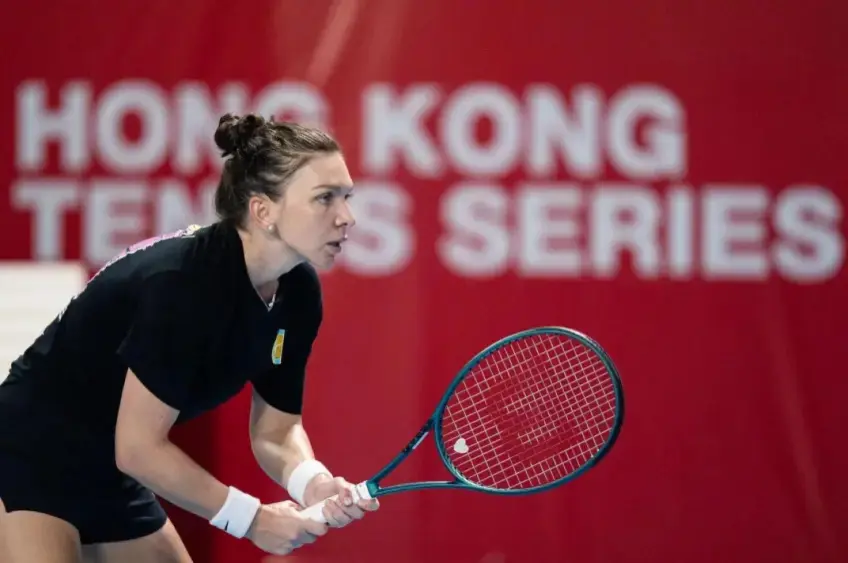
Simona Halep Can Prove the Real Doping Is Mental — And It’s Completely Legal
Simona Halep, a two-time Grand Slam champion and former world No. 1, has faced one of the most tumultuous periods of her career due to a doping suspension that has kept her out of competitive tennis since October 2022. Accused of testing positive for the banned substance Roxadustat, Halep’s suspension has not only sidelined her from the sport but has also raised questions about the fairness of doping allegations in modern tennis.
Despite the controversy surrounding her case, Halep’s situation opens up a broader conversation about what it truly means to gain an advantage in professional sports. While banned substances and physical enhancements dominate the headlines, Halep’s resilience and determination highlight a different kind of performance booster — the mental edge that athletes develop to reach the top. In this light, her case serves as a reminder that “mental doping,” while intangible and entirely legal, can be the most powerful tool in an athlete’s arsenal.
The Doping Allegation and Its Impact
Simona Halep’s positive test for Roxadustat, a substance that boosts red blood cell production and improves oxygen delivery, shocked the tennis world. Known for her relentless work ethic and gritty playing style, Halep had long been admired for her ability to outlast and outmaneuver her opponents rather than overpower them.
Halep has vehemently denied knowingly ingesting any banned substance, maintaining her innocence throughout the investigation. In her defense, she cited possible contamination of supplements, a scenario that has occurred with other athletes in the past. Regardless of the outcome, the case has taken a toll on her career and reputation.
Her suspension has also reignited debates about anti-doping protocols in tennis. Critics argue that the current system, while necessary to maintain fair play, is not foolproof and often fails to account for accidental ingestion or unintentional exposure to banned substances.
The Role of Mental Strength in Halep’s Career
Throughout her career, Halep has exemplified the importance of mental fortitude in tennis. Standing at just 5’6” in a sport dominated by taller and more powerful players, she has relied on her tactical intelligence, physical conditioning, and mental resilience to compete at the highest level.
Halep’s journey to the top has been anything but smooth. She faced early criticism for her decision to undergo breast reduction surgery to enhance her mobility on the court, a move that underscored her commitment to maximizing her potential. Despite setbacks and near-misses in Grand Slam finals, she persevered, eventually capturing her first major title at the 2018 French Open and following it up with a stunning victory at Wimbledon in 2019.
Her mental strength was evident in her ability to recover from crushing defeats, adapt her game to different surfaces, and outlast her opponents in grueling matches. It’s this mental edge — the ability to stay focused, confident, and composed under pressure — that Halep believes is the real game-changer in professional tennis.
What Is “Mental Doping”?
While the term “mental doping” is not recognized in any official capacity, it speaks to the idea of using psychological techniques to enhance performance. Unlike physical doping, which involves substances or methods to improve physical capabilities, mental doping refers to developing mental skills that give athletes a competitive edge.
Visualization, mindfulness, mental rehearsal, and positive self-talk are just a few examples of strategies athletes use to boost their performance legally. These techniques can be just as effective as physical training, helping athletes manage stress, maintain focus, and perform at their best under pressure.
For Halep, her career is a testament to the power of mental toughness. Despite facing physical disadvantages and external criticism, she has consistently defied expectations through her unwavering belief in her abilities and her capacity to adapt and improve.
The Broader Implications for Tennis
Halep’s case sheds light on the complexities of what constitutes a “fair” advantage in sports. While doping rules aim to ensure a level playing field, they focus primarily on physical enhancements and fail to account for the mental and psychological factors that influence performance.
In tennis, where matches can last for hours and hinge on a few critical points, mental strength is often the deciding factor. Players like Rafael Nadal, Novak Djokovic, and Serena Williams have demonstrated how mental resilience can turn the tide in seemingly unwinnable matches.
Halep’s emphasis on the mental side of the game challenges the notion that physical enhancements are the only way to gain an edge. Her ability to outthink, outlast, and outmaneuver her opponents underscores the importance of mental preparation in achieving success.
Halep’s Road to Redemption
As Halep awaits the resolution of her doping case, she remains focused on proving her innocence and returning to the sport she loves. In interviews, she has spoken about the emotional toll of the suspension and the challenges of staying motivated during such a difficult period.
However, Halep’s story is far from over. At 32 years old, she still has time to make a comeback and rebuild her career. Her resilience in the face of adversity, coupled with her mental strength, makes her well-equipped to handle the challenges ahead.
Halep’s situation also serves as a reminder to the tennis community that fairness extends beyond physical capabilities. By emphasizing the role of mental preparation, her case could inspire a broader understanding of what it takes to succeed in professional sports.
Conclusion
Simona Halep’s doping suspension has brought her career to a temporary standstill, but it has also highlighted the importance of mental strength in tennis. While physical enhancements dominate discussions about fairness, Halep’s career demonstrates that the real edge often lies in the mind.
As the tennis world awaits the resolution of her case, Halep’s story serves as a powerful reminder that resilience, adaptability, and mental toughness are the true hallmarks of a champion. Whether she is ultimately vindicated or not, her legacy will endure as a testament to the power of determination and the indomitable human spirit.
Leave a Reply